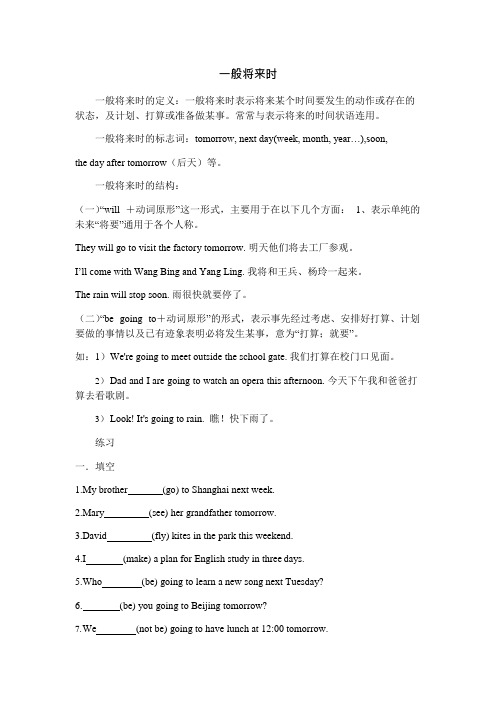(完整版)一般将来时
(完整版)一般将来时课件(PPT)

2.与“next一家” 连用
next
time year week month term Monday at 7:00 next Sunday morning ……
2.He will find some meat in the fridge soon. (变一般疑问句) W __i_ll he _f_in_d _a_n_y_ meat in the fridge?
3.She will stay there in a week. (对划线部分提问) __H_o_w _s_o_on_ w_i_ll__ she _s_t_a_y_ there?
We will/shall go to Beingjing next week.
He will go to Beingjing next week
(2).变一般疑问句和否定句:
They will have an English party next week. Will they have an English party next week?
2. be going to+do可表示事先计划的意图,而 will 则表示说话人当时决定的意图;
We're going to drive you home after the meeting. Don't call a taxi. We'll drive you home.
I feel ill now, and I'll go to see the doctor. I'm going to see the doctor this evening.
完整版一般将来时时态用法讲解

般将来时时态1. 一般将来时的定义一般将来时表示在现在看来即将要发生的动作或存在的状态。
常用时间副词tomorrow, soon 或短语n ext year / week / mon th, in a few days, in the future, sometime 做状语。
如:What will you do this afternoon ? 你今天下午干什么?We will have a meet ing tomorrow. 我们明天要开会。
He is going to study abroad (到国外) next year.明年他要出国学习。
2. 一般将来时的结构及应用(1) shall / will + 动词原形。
表示即将发生的动作或存在的状态。
特别是表示客观性的事情或在某条件下要发生的事情,只能用此结构。
如:What shall we do if he doesn '如果他不?来,我们该怎么办?Will you be free this evenin g? 今天晚上有空吗?I think he will tell us the truth (真相)。
我想他会告诉我们真实情况的。
(2) be going to +动词原形。
表示已经计划或安排好了的事情,也可表示有迹象表明肯定要发生的事情。
如:We are going to have a meeting to discuss (讨论)the matter this evening. 今天晚上开会讨论这件事情。
Look at the black clouds over there. I think it is going to rain soon. 看一看那边的乌云,我想天要下雨了。
There is going to be an En glish evening this week. 本周要举行一个英语晚会。
(3) be +现在分词。
(完整版)一般将来时的定义、结构、例句、用法

(完整版)一般将来时的定义、结构、例句、用法一般将来时一、定义一般将来时表示将来某一时刻的动作或状态,或将来某一段时间内经常的动作或状态。
常常和表示将来的时间状语连用。
如:tomorrow(明天),next week(下周);in the future (将来)等。
一般将来时由助动词shall(第一人称),will(第二、三人称)动词原形构成。
美国英语则不管什么人称,一律用will。
二、结构(一)常见结构1、will / shall + 动词原形(否定句在will/shall后加not)这种方法一般单纯地表示将来某个时间将要发生的动作或存在的状态。
will用于各种人称;shall只用于第一人称。
例如:I will / shall go to visit him next week. 下周我将去拜访他。
What time shall we go there tomorrow? 明天我们几点去那儿?2、be going to+动词原形be going to 相当于一个助动词(其中be有人称和数的变化),与它后面的动词原形一起构成谓语。
用来表示将要发生的动作以及计划、安排和打算要做的事。
例如:There is going to be a football match this afternoon.今天下午将有一场足球赛。
I‘m going to go to the park. 我将要去公园。
(二)常用结构1、用于"I expect, I'm sure, I think, I wonder等的宾语从句"中。
Don't worry about the exam. I'm sure you'll pass.不要担心这次考试,我确信你会通过的。
2、用于祈使句和陈述句中。
Work hard and you will succeed.如果你努力,就会成功的。
3、与表示时间或条件的状语从句连用。
(完整版)初中英语语法一般将来时态

与一般将来时连用的时间状语
tomorrow 明天 the day after tomorrow 后天 soon 很快
this year 今年 next week 下周 in the future 将来
in three days 三天后
in ten minutes 在一般将来时 中用IN 表示在多久以后
What are they going to do this evening? They are going to watch TV.
What is the bear going to do tomorrow?
It is going to cook dinner.
What are they going to do ?
There will be only one country. 否定句:在will后面加not.
There won’t be only one country. 一般疑问句:把will提到there之前。
Will there be only one country? Yes, there will. / No, there won’t.
一般将来时的主要用法:
1、表示将来某一时刻的动作或状态: We will come to see you the day after tomorrow. There will be a wonderful show next week.
2、表示将来某一段时间内经常的动作或状态: The students will come and work in the lab once a
They will do heavy work.
They won`t do Will they do heavy work. heavy work?
(完整)一般将来时的被动语态

I语法:一般将来时的被动语态一般将来时的被动语态“……将要被……”,其常用的表达形式有“will/shall+be+及物动词的过去分词”,“be going to+be+及物动词的过去分词”,“be to+be+及物动词的过去分词”三种。
一、一般将来时的被动语态的几种句式:1、肯定式:主语+shall/will+be+及物动词的过去分词+其他2、否定式:主语+shall/will+ not+be+及物动词的过去分词+其他3、一般疑问式:Shall/Will+主语+be+及物动词的过去分词+其他4、特殊疑问式:特殊疑问词+shall/will+主语+be+及物动词的过去分词+其他二、一般将来时的被动语态的用法:1、表示根据计划或者安排将要发生的被动动作。
2、表示有固定性条件就有规律性的被动结果。
Heated to 100 0C, water will be turned into steam。
加热到100摄氏度,水将会变成水蒸汽。
If you speak in class, you will be punished.三、一般将来时被动语态的注意事项:1、在时间、条件状语从句中,应使用现在时表示将来时。
同样,应使用现在时的被动语态表示将来时的被动语态。
He says he will leave the company if he is punished for this。
When the dam is completed, the Changjiang River will be controlled。
2、使用一般将来时的被动语态时,不要遗漏被动式中的be.现在完成时的被动语态现在完成时的被动语态强调一个发生在过去的被动性动作持续到现在或对现在造成的影响或结果。
一、现在完成时的被动语态的构成:Have/has+been+及物动词的过去分词二、现在完成时的被动语态的形式:1、肯定式:主语+have/has+be+及物动词的过去分词+其他The car has been repaired.2、否定式:主语+have/has+ not+be+及物动词的过去分词+其他The house has not been cleaned for a long time。
(完整版)六年级英语一般将来时讲解加练习(可编辑修改word版)

(一)“will+动词原形”这一形式,主要用于在以下几个方面:1、表示单纯的未来“将要”通用于各个人称。
They will go to visit the factory tomorrow.明天他们将去工厂参观。I’ll come with Wang Bing and Yang Ling.我将和王兵、杨玲一起来。The rain will stop soon.雨很快就要停了。
?Yes,.No,.10.Hewillgoshopping.
?Yes,.No,.
改
2.Whowilltoplay basketball?改
ABC
3.Tom andAnnwillbuyingsomeclothes.改
ABC
4.WhatdoyoudoathomenextSaturday?改
ABC
5.Is Lynngo fishingwithyoutomorrow?改
(二)“begoingto+动词原形”的形式,表示事先经过考虑、安排好打算、计划要做的事情以及已有迹象表明必将发生某事,意为“打算;就要”。
如:1)We're going to meet outside the school gate.我们打算在校门口见面。
2)DadandIaregoingtowatchanoperathisafternoon.今天下午我和爸爸打算去看歌剧。
ABC
6.Li Ming’s friend is going to sinபைடு நூலகம்ing asongtomorrow.改
D. are make
4.() Are yougoingtothirteen years old nextyear?
A.willbeB.areC.beD. go
(完整版)一般将来时

4. Books will only _b__e__(are) on
computers, not on paper.
there be 一般现在时
• 肯n the desk.
一般将来时
定义:表示将要发生的事或打 算、计划、决定要做的事情。
一般将来时的构成:
1.will+动词原形,表示一般将来时,所有人 称都可以使用.
2.be+going+to表示即将发生某事或打算计划 做某事.
e, go, start, move, sail, leave, travel等动词常用进行时态表示按计划将 要发生的事.
与一般将来时连用的时间状语
tomorrow 明天 the day after tomorrow 后天 soon 很快 不久 in three days 三天后
this year 今年 next week 下周 in the future 将来 some day 将来的某一天
will+动词原形
• I will go to Beijing next year. • I will help my mother do the
I'm coming now.
I'm going shopping.
I'm going to sleep.
be going to do 结构
I'm leaving at 5:00
否定句, 疑问句?
用将所下将列给下各单列句词各改的句为适改一当为般形否疑式定问填句句空。。。
一般将来时(完整版)

一般将来时(完整版) -CAL-FENGHAI-(2020YEAR-YICAI)_JINGBIAN一般将来时(完整版)一、单项选择一般将来时1.---I don’t know when _____ tomorrow.---I will call you as soon as he_____.A.will he come; arrives B.he will come; arrivesC.he will come; will arrive D.will he come; will come【答案】B【解析】考查时态。
第一句为when 引导的宾语从句,从句的时态,要根据时态本身来决定,第二句为if 引导的条件状语,主句为一般将来时,从句要用一般现在时,代替将来时,故选答案为B2.China's present environment situation is from bad to worse and if we _________ now to protect the environment, we’ll live to regret it.A.hadn’t acted B.haven’t acted C.don’t act D.won’t act【答案】C【解析】试题分析:句意:中国目前的环境状况越来越糟糕,如果我们现在不采取行动来保护环境,我们将会后悔。
if引导的条件状语从句,主句为一般将来时态,if从句用一般现在时态,选C。
考点:考查时态3. - Will you be available at three o'clock tomorrow afternoon?- No. I ______ a lecture then.A.are attending B.will have attended C.will attend D.will be attending 【答案】D【解析】试题分析:考查动词时态。
- 1、下载文档前请自行甄别文档内容的完整性,平台不提供额外的编辑、内容补充、找答案等附加服务。
- 2、"仅部分预览"的文档,不可在线预览部分如存在完整性等问题,可反馈申请退款(可完整预览的文档不适用该条件!)。
- 3、如文档侵犯您的权益,请联系客服反馈,我们会尽快为您处理(人工客服工作时间:9:00-18:30)。
一.一般将来时:表示将来某个时间(相对于讲话时间)将要发生或存在的状态,也表示将来的一段时间内经常或反复发生的动作,常与表示将来的时间连用,如下:tomorrow明天the next time下一次the day after tomorrow后天next week下周next year明年tomorrow evening明天晚上in the future将来later(on)以后before long不久后其基本句型如下:(一)will:will+动词原形,可以用于第一,第二,第三人称及其复数(不分人称)。
<1>陈述句肯定句:主语+ will + 动词原形(+将来的时间或地点).否定句:主语+ won’t + 动词原形(+将来的时间或地点)例句:I will play the piano at the concert.我将要在音乐会上弹钢琴。
I won’t go to school tomorrow.我明天不上学。
<2>特殊疑问句特殊疑问词+will+人称+动原+将来的时间?答句:人称+will+动词原形.例句:What will you be in the year 2050? 2050年你将会成为什么?I will be a doctor.我将会成为一个医生。
<3>一般疑问句Will+人称+动词原形(+将来的时间或地点)?答句:Yes,人称+will. No,人称+won’t.例句:Will you visit your grandparents this Saturday? 这周六你是否去拜访你的爷爷奶奶?Yes, I will.(二)shall:shall+动词原形,只能用于第一人称的单复数(I, we)<1>陈述句肯定句:I/We shall + 动词原形(+将来的时间或地点)。
我/我们将要…否定句:I/We shall not + 动词原形(+将来的时间或地点)。
我/我们将不会…<2>特殊疑问句:特殊疑问词+ shall + 人称+ 动词原形(+将来的时间)?答语:I/We shall + 动词原形例如:What shall we do?我们该怎么办?Where shall I go?我该去哪呢?<3>一般疑问句Shall I / we + 动词原形(+将来的时间或地点)?答语:Yes, I / we shall. No, I / we shall not.例句:Shall I/ we go to school tomorrow? 我/我们明天将要上学吗?Yes, we shall. No, we shall not.(三)be going to结构,根据人称及单复数变换系动词be的形式(am, is, are)。
*(1)be going to +动词原形,表示将来要做某事或发生某事。
(2)be going to + 地点,表示将要去某地(3)be going there/here.将要去那里/这里一、单项选择。
1. There __________ a meeting tomorrow afternoon.A. will be going toB. will going to beC. is going to beD. will go to be2. Charlie ________ here next month.A. isnt workingB. doesnt workingC. isnt going to workingD. wont work3. He ______ very busy this week, he ________ free next week.A. will be; isB. is; isC. will be; will beD. is; will be4. There ______ a dolphin show in the zoo tomorrow evening.A. wasB. is going to haveC. will haveD. is going to be5. –________ you ________ free tomorrow?–No. I ________ free the day after tomorrow.A. Are; going to; willB. Are; going to be; willC. Are; going to; will beD. Are; going to be; will be6. Mother ________ me a nice present on my next birthday.A. will givesB. will giveC. givesD. give7. –Shall I buy a cup of tea for you?–________.A. No, you wont.B. No, you arent.C. No, please dont.D. No, please.8. –Where is the morning paper?–I ________ if for you at once.A. getB. am gettingC. to getD. will get9. ________ a concert next Saturday?A. There will beB. Will there beC. There can beD. There are10. If they come, we ________ a meeting.A. haveB. will haveC. hadD. would have11. He ________ her a beautiful hat on her next birthday.A. givesB. gaveC. will givingD. is going to giving12. He ________ to us as soon as he gets there.A. writesB. has writtenC. will writeD. wrote13. He ________ in three days.A. coming backB. came backC. will come backD. is going to coming back14. If it ________ tomorrow, well go roller-skating.A. isnt rainB. wont rainC. doesnt rainD. doesnt fine15. –Will his parents go to see the Beijing opera tomorrow?–No, ________ .A. they willnt.B. they wont.C. they arent.D. they dont.16. Who _____ we ______ swimming with tomorrow afternoon?A. will; goB. do; goC. will; goingD. shall; go17. We ________ the work this way next time.A. doB. will doC. going to doD. will doing18. Tomorrow he ________ a kite in the open air first, and then ________ boating in the park.A. will fly; will goB. will fly; goesC. is going to fly; will goesD. flies; will go19. The day after tomorrow they ________ a volleyball match.A. will watchingB. watchesC. is watchingD. is going to watch20. There ________ a birthday party this Sunday.A. shall beB. will beC. shall going to beD. will going to be21. They ________ an English evening next Sunday.A. are havingB. are going to haveC. will havingD. is going to have22. ________ you ________ free next Sunday?A. Will; areB. Will; beC. Do; beD. Are; be23. He ________ there at ten tomorrow morning.A. willB. isC. will beD. be24. ______your brother ______ a magazine from the library?A. Are; going to borrowB. Is; going to borrowC. Will; borrowsD. Are; going to borrows25. –Shall I come again tomorrow afternoon?–________ .A. Yes, pleaseB. Yes, you will.C. No, please.D. No, you wont.26. It ________ the year of the horse next year.A. is going to beB. is going toC. will beD. will is27. ________ open the window?A. Will you pleaseB. Please will youC. You pleaseD. Do you28. –Lets go out to play football, shall we?–OK. I ________.A. will comingB. be going to comeC. comeD. am coming29. It ________ us a long time to learn English well.A. takesB. will takeC. spendsD. will spend30. The train ________ at 11.A. going to arriveB. will be arriveC. is going toD. is arriving改句子。
